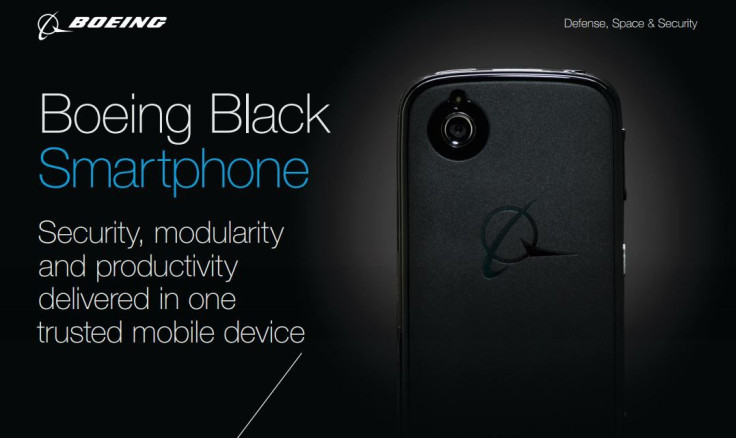Boeing Black: A Super-Secure Smartphone That Would Rather Die Than Spill Its Secrets

Boeing (NYSE:BA), better known for building aircraft, has developed a new, secure smartphone that will self-destruct if any unauthorized attempts are made to open it up.
The smartphone, dubbed the Boeing Black, is said to be aimed at government agencies and contractors who need to keep communication and data secure. The phone can encrypt calls, delete all data and render itself inoperable if someone attempts to tamper with its casing.
“The U.S. defense and security communities demand trusted access to data to accomplish their missions. Despite the continuous innovation in commercial mobile technology, current devices are not designed from inception with the security and flexibility needed to match their evolving mission and enterprise environment,” Boeing said, on its website. “The Boeing Black smartphone was designed with security and modularity in mind to ensure our customers can use the same smartphone across a range of missions and configurations.”
Assembled in the U.S., Boeing Black runs on Google’s (NASDAQ:GOOG) Android mobile-operating system, and with a 5.2-by-2.7-inch body, the device is slightly bigger than Apple’s (NASDAQ:AAPL) iPhone 5s. The phone supports dual SIM cards and can access multiple cell networks instead of a single network like a normal cellphone.
Boeing Black can operate on WCDMA, GSM and LTE frequency bands, and it also offers WiFi and Bluetooth connectivity along with ports to allow “integrating additional sensors or technology enhancements like satellite connectivity or expanding power.”
Here is an excerpt from the papers that Boeing filed with the U.S. Federal Communications Commission, or FCC:
The Boeing Black phone is manufactured as a sealed device both with epoxy around the casing and with screws, the heads of which are covered with tamper proof covering to identify attempted disassembly. Any attempt to break open the casing of the device would trigger functions that would delete the data and software contained within the device and make the device inoperable.
Boeing Black, which took the company 36 months to develop, is not yet available in the market, but Boeing is in talks with potential customers to launch the handset in coming days, according to Rebecca Yeamans, a Boeing spokeswoman, who did not reveal details on pricing or the names of wireless carriers and handset makers the company is in talks with.
Although news about a Boeing smartphone surfaced online in 2012, the official revelation on the company's website Wednesday shed more light on the smartphone’s capabilities.
According to a video demonstration by the company, users can add components to Boeing Black to reach special networks, expand the battery and attach biometric sensors. Check out the video here:
Boeing said in the FCC filing that the phone would be sold directly by the company or its agents. According to the company, the phone’s hardware specs are exempted from Freedom of Information Act requests because they contain “trade secrets” and are vital to national security.
In addition, users of the Boeing Black will have to sign a non-disclosure agreement to maintain secrecy about the phone’s hardware, software, performance, applications and all other details the company considers as “proprietary information.”
Here are some of the details about the phone, shared by the company:
Display: 4.3-inch qHD (540x960 pixels)
Weight: 170g
Battery: Lithium-Ion 1590 mAh
Dual SIM Supported Bands:
- LTE 700/1700/2100
- WCDMA 850/1900/2100
- GSM850/900/1800/1900
Bluetooth v2.1 + EDR-enabled connectivity
Processor: Dual 1.2 GHz ARM Cortex-A9 CPUs
Storage: On-board + microSD
Expansion Ports: micro USB, PDMI, Modular 24-Pin Connector
© Copyright IBTimes 2024. All rights reserved.












